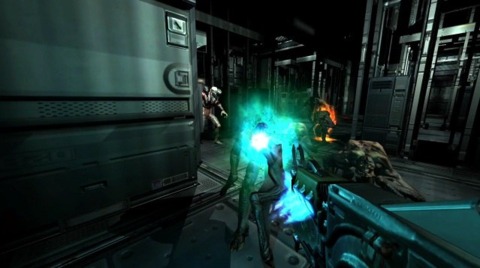The Customer Is Not Always Right
How fan feedback changes to Doom 3: BFG Edition and Mass Effect 3 cheapen the originals and undermine the artistic growth of the medium.
Yesterday, Bethesda Softworks announced Doom 3 BFG Edition, a console and PC re-release of the occasionally derided 2004 first-person shooter from id Software. While Bethesda detailed a wealth of new content and tweaks for the package, one in particular gave me pause. In the original Doom 3, players had access to a flashlight, but they couldn't hold a weapon as they were using it. For the BFG Edition, the flashlight is "armor-mounted," so players don't need to choose between seeing their environment and defending themselves from its many monsters.

While the flashlight limitation was a frequent complaint among players and reviewers, it was also a deliberate and no doubt carefully considered design decision. Obviously players would want to see enemies and kill them simultaneously, but the developers denied them that ability to foster a more tense atmosphere and provoke a specific emotional response. Seeing the cavalier way in which id Software is changing a facet of the design so core to the original Doom 3 is disappointing in the same way as George Lucas' continued tinkering with the original Star Wars trilogy, or BioWare's revisiting Mass Effect 3's ending in light of consumer complaints.
"Whether these post-release changes are actually improving the works in question is irrelevant. That these changes are being made at all is an admission that the original works are not inherently valuable."
At least in the case of Star Wars the ideas for the changes came from one of the original creators. With Doom 3 and Mass Effect 3, the alterations came at the behest of the audience, essentially a crowdsourcing of development decisions. Whether these post-release changes are actually improving the works in question is irrelevant. That these changes are being made at all is an admission that the original works and the decisions made therein are not inherently valuable. If creators are willing to change the fundamentals of their art just because the audience didn't like it, then clearly those creators didn't care all that much about what they were doing or saying in the first place.
And that might be the most damaging idea in play here, because it lends itself to treating games more like a product where the customer is always right than an art form capable of meaning. The more decisions are made based on what the audience wants, the less room there is for the kind of creativity that might frequently result in failure, but every now and then pushes the medium forward in huge strides. And when there's less room for experimentation that could potentially alienate an audience, we get more games designed to be safe and approachable for the masses, an industry where everything tries to be Call of Duty. (Like, even more than it already does.)
That might make for a more polished--and perhaps "better"-- slate of games hitting stores each year, but it will also make them less varied and less interesting. If music worked like this, Bob Dylan never would have gone electric, and the Beatles wouldn't have dropped the pop pablum of "I Want to Hold Your Hand" to create classics like Abbey Road and Sgt. Pepper's Lonely Hearts Club Band. Literature would never have seen Joyce's Ulysses or Burroughs' Naked Lunch. Comics like Maus and Watchmen could not have been made. The world of cinema never would have allowed for the careers of Stanley Kubrick, David Lynch, or Nicolas Cage.
"All creators need to be free to challenge their audiences."
People may disagree on the merits of all of these, but they are clearly the result of bold choices made with no guarantee that they would be well received. The creators behind them went out on a limb and tried to make something new or significant, and each of those art forms is unquestionably richer for it. Yes, even in the case of Nic Cage. Perhaps especially in the case of Cage.
All creators need to be free to challenge their audiences, because the alternative is a disservice to all involved. A creator who panders to an audience is treating them as predictable dupes rather than respected equals. An audience being spoon-fed what they think they want is being treated as a consumer of product rather than an appreciator of art. And any art that aspires to nothing artistic becomes as disposable as anything else we consume, digest, and flush away. That might be how id Software and BioWare view games--they're certainly allowed to--but that doesn't mean we need to encourage it.
Got a news tip or want to contact us directly? Email news@gamespot.com
Join the conversation